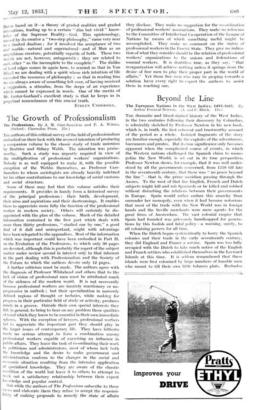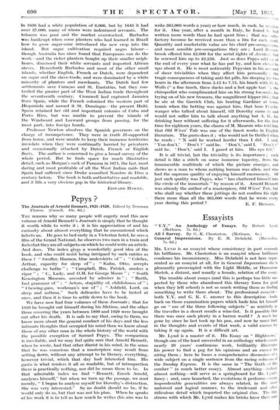Beyond the Line
Tan dramatic !and blood-stained history of the West Indies, -in the two centuries following their discovery by Columbus, is admirably sketched hy Professor Newton in his new book, which is, in truth, the first coherent and trustworthy account of the period as a whole. Isolated fragments of the story are familiar enough, especially the exploits of the adventurers, buccaneers and pirates. But its true Significance only becomes apparent when the complicated course of events, in which the Western nations challenged the Spanish claim to mono- polize the New World, is set out in its true perspective. Professor Newton shows, for example, that it was well under- stood by all the governments concerned, from 1559 till late in the seventeenth century, that there was "no peace beyond the line "—that is, the prime meridian passing through the Azores. To the west of that line English, French and Dutch subjects might kill and rob Spaniards or be killed and robbed without disturbing the relations between their governments in Europe. Spain would rather endure this anarchy than surrender her monopoly, even when it had become notorious that most of the trade with the New World was in foreign hands and the Seville merchants were mere agents for the .great firms of Amsterdam. The vast colonial empire that Spain had founded was grievously handicapped for genera- tions by this foolish and fatal policy—a warning, surely, to all colonizing powers for all time.
When the Dutch began systemat Molly to harry the Spanish colonies and their trade in the early seventeenth century, they did England and France a service. Spain was too fully occupied with the Dutch to take much notice Of the English and French settlers who established themselves in the Leeward Islands at this time. It is seldom remembered that these islands were first colonized by large numbers of 1 ble men who meant to till their own little tobacco plots. Barbados
in 1636 _had_ a white population of _6,000, but by 1643 it han over 37,000, many of whom were indentured servants. The tobacco was poor and the market overstocked. Barbados was bankrupt when some planters who had learned in Brazil how to grow sugar-cane introduced the new crop into the island. But sugar cultivation required negro labour— though Australia has since found that Europeans can do the work—and the richer planters bought up their smaller neigh- bours, dismissed their white servants and imported African slaves. Henceforth Barbados and most of the other small islands, whether English, French or Dutch, were dependent on sugar and the slave-trade, and were dominated by a white aninority of planters and Merehants. The Dutch had few settlements save Curacao and St. Eustatius, but -they con- trolled the greater part of the West Indian trade throughout the seventeenth century. Cromwell had captured Jamaica from Spain, while the French colonized the western part of ,Hispaniola and named it St -Domingue—the present Haiti. Spain retained her old and important colonies of Cuba and Porto Rico, but was unable to prevent the islands of the Windward and Leeward groups from passing, for the most part, into foreign hands.
Professor Newton absolves the Spanish governors on the charge of incompetence. They were in path ill-supported from home, and were unable to -keep their immense territories inviolate when they were continually harried by privateers and occasionally attacked by Dutch, French or English fleets. The author is concerned to give a broad survey of the whole period. But he finds space for much illustrative detail, such as Morgan's sack of Panama in 1671, the last, most daring and most profitable of all the West Indian raids that Spain had suffered since Drake assaulted Nombre de Dios a century before. The book is both authoritative and readable, and it fills a very obvious gap in the historical library.
EDWARD HAWKE.

































 Previous page
Previous page